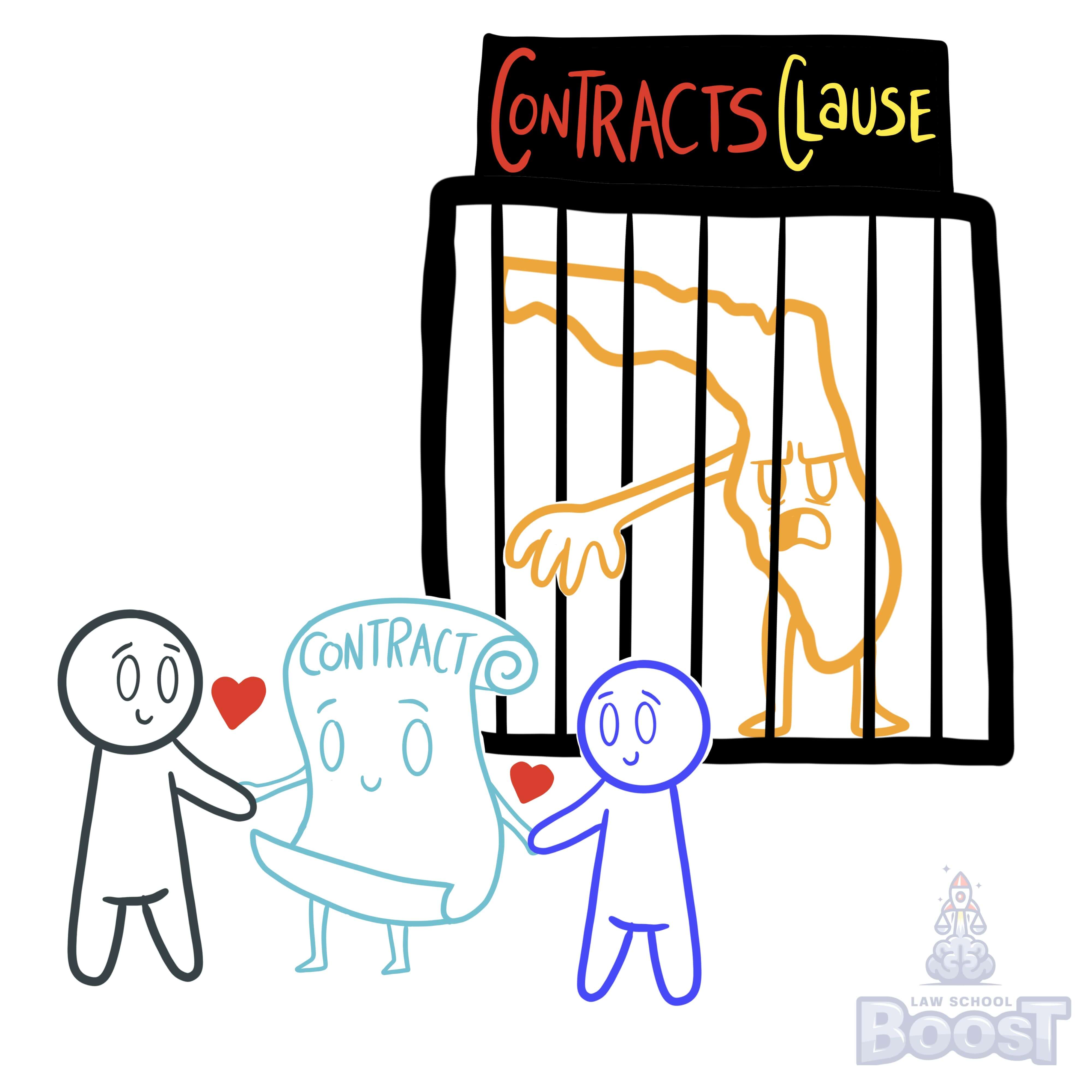🇺🇸
Constitutional Law • Contracts Clause
CONLAW#071
Legal Definition
The Contracts Clause prohibits state and local governments from impairing the obligations of existing contracts, but does not apply to the federal government.
Plain English Explanation
The Contracts Clause is part of the U.S. Constitution. It prevents state and local governments from passing laws that destroy or negatively change contracts that already exist. For example, say you sign a contract with a company to provide lawn care services for 5 years at a set price. If your state passes a law the next year that bans lawn care contracts over 1 year, that new law could not be applied to your existing 5-year contract. The purpose of the clause is to stop state/local governments from interfering with private contracts. The framers wanted to encourage trade/business deals by giving people confidence that the government won't later invalidate the terms. However, this rule only restricts state/local governments, not the federal government. The federal government can still pass laws that impair existing contracts.
Hypothetical
Hypo 1: Bob rents an apartment from Sam in Hypofornia. They have a year-long lease agreement. Midway through, Hypofornia passes a new law saying all rental agreements are now month-to-month to give renters more flexibility. Result: The Contracts Clause would stop this law from affecting Bob and Sam's existing year-long lease. They can continue under their original agreement until it ends.
Hypo 2: Sam loans Bob $1,000, agreeing that Bob will pay back $1,100 after a year. After 6 months, New Hypoland passes a law stating all personal loans must have zero interest. Result: The Contracts Clause would prevent New Hypoland's law from changing the terms of Bob and Sam's loan agreement. Bob still owes Sam $1,100 at the year's end.
Hypo 3: Bob and Sam enter a business contract where Bob will deliver 100 handmade chairs to Sam's store in Hypofornia by the end of the year. Hypofornia later passes a law banning the sale of handmade furniture to protect factory jobs. Result: Under the Contracts Clause, the ban cannot apply to Bob and Sam's existing contract, and Bob can still deliver the chairs as agreed.
Hypo 4: Bob and Sam sign a contract agreeing to use federal land in Hypofornia for a joint mining project. Later, the federal government revokes their permit, citing new environmental regulations. Result: The Contracts Clause does not apply because this situation involves the federal government, not a state or local authority. The federal government is not restricted by the Contracts Clause and can revoke the permit based on its regulations.
Hypo 2: Sam loans Bob $1,000, agreeing that Bob will pay back $1,100 after a year. After 6 months, New Hypoland passes a law stating all personal loans must have zero interest. Result: The Contracts Clause would prevent New Hypoland's law from changing the terms of Bob and Sam's loan agreement. Bob still owes Sam $1,100 at the year's end.
Hypo 3: Bob and Sam enter a business contract where Bob will deliver 100 handmade chairs to Sam's store in Hypofornia by the end of the year. Hypofornia later passes a law banning the sale of handmade furniture to protect factory jobs. Result: Under the Contracts Clause, the ban cannot apply to Bob and Sam's existing contract, and Bob can still deliver the chairs as agreed.
Hypo 4: Bob and Sam sign a contract agreeing to use federal land in Hypofornia for a joint mining project. Later, the federal government revokes their permit, citing new environmental regulations. Result: The Contracts Clause does not apply because this situation involves the federal government, not a state or local authority. The federal government is not restricted by the Contracts Clause and can revoke the permit based on its regulations.
Visual Aids



